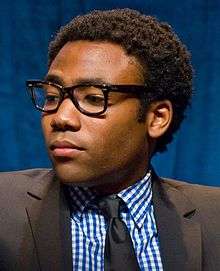Remedial Chaos Theory
"Remedial Chaos Theory" is the fourth episode of the third season of the U.S. television series Community. The episode was written by Chris McKenna and directed by Jeff Melman. It originally aired on October 13, 2011 on NBC. It follows a community college study group at a housewarming party for members Troy Barnes (Donald Glover) and Abed Nadir (Danny Pudi). When Jeff Winger (Joel McHale) throws a die to determine who will go to collect the pizza delivery from downstairs, seven different timelines unfold, showing each of the group leaving to collect it depending on the outcome of the die—including the canonical timeline, in which Abed catches it before it lands. The episode was intended to be the third episode of the season, but was delayed by a week due to filming, editing and visual effects overrunning. As a result, "Competitive Ecology", due to be fourth, was aired third.
| "Remedial Chaos Theory" | |
|---|---|
| Community episode | |
| Episode no. | Season 3 Episode 4 |
| Directed by | Jeff Melman |
| Written by | Chris McKenna |
| Featured music | "Roxanne" by The Police |
| Production code | 303 |
| Original air date | October 13, 2011 |
| Running time | 21 minutes |
| Awards | See awards and nominations. |
"Remedial Chaos Theory" is a concept episode, with each timeline showing how the group is affected by the absence of one of its members. "The Darkest Timeline" ensues when Troy leaves, causing Pierce to be shot and a fire to ensue. Further episodes continued plot points from this timeline. The episode overall received critical acclaim, lauded by fans and critics alike as one of the best episodes of the show. It has been described as one of the best episodes of 2011 or of the 2010s. McKenna received a PAAFTJ Award and an Emmy Award nomination for his work on the episode. "Remedial Chaos Theory" also received a Hugo Award nomination.
Plot

Troy and Abed invite their community college study group to their apartment for a housewarming party. After Abed shows off his Raiders of the Lost Ark boulder diorama, the group begin playing Yahtzee. Jeff rolls a die to determine which of the group must collect the pizza delivery, numbering starting from his left. Abed claims that Jeff is creating six different "timelines" by rolling the die.
Jeff rolls a two, so Annie (Alison Brie) gets the pizza. As Pierce (Chevy Chase) claims he had sex with Eartha Kitt, Britta (Gillian Jacobs) plays "Roxanne" and is stopped by Jeff. Troy finds a gun in Annie's bag. Pierce tries to give Troy a present. Jeff hurts his head on the ceiling fan as he stands up. Annie returns, calling the pizza guy a creep. Similar scenes subsequently arise when the scene is restarted, Jeff rolling a different number each time. It arises that Shirley (Yvette Nicole Brown) has a baking problem and Pierce's gift is a Norwegian troll. Other recurring scenes include Abed catching the diorama boulder as it rolls, Britta smoking marijuana in the bathroom and Annie inspecting Jeff's head injury.
When Shirley leaves, the group let her pies burn, so she insults them and exits. When Pierce leaves, Troy unloads to Britta about Jeff making him feel insecure. When Britta leaves, Pierce torments Troy with the troll; Britta returns, engaged to the pizza guy. "The Darkest Timeline" arises when Troy leaves. The diorama boulder falls and Annie trips over it, flipping a table. Her gun discharges and shoots Pierce in the leg. Shocked, a cigarette falls out of Britta's mouth and starts a fire. Troy returns to find the troll staring at him. When Abed leaves, Shirley learns Britta smoked marijuana, Troy becomes furious at Pierce, and Jeff and Annie kiss. In a seventh timeline, Abed catches the die and exposes Jeff's plan: there are seven people and the die has six sides, so Jeff never has to collect the pizza. The group make him do so and dance to "Roxanne". Abed suggests that Annie move into the apartment.
The end tag shows the Darkest Timeline: Shirley is an alcoholic; Pierce died; Annie was sent to a mental health ward; Jeff lost an arm; Troy lost his larynx; Britta put a blue streak in her hair. Abed makes felt goatees for the remaining members of the group, suggesting that they all become evil versions of themselves and journey to the main timeline.
Production

"Remedial Chaos Theory" was broadcast as the fourth episode of the third season. The episode premiered on NBC on October 13, 2011, a Thursday 8 p.m. timeslot.[1] It was written by Chris McKenna, his sixth writing credit of the series.[2] The writers used annotated diagrams, or "story circles", one for each character per timeline, displaying the character's actions in that timeline;[3] series creator Dan Harmon later published images of them on Tumblr.[4][5] The episode marks the first directing credit of the show for Jeff Melman.
The episode was originally intended to air as the third episode, but was delayed a week because the episode still needed to be completed, including editing, reshoots, and visual effects.[6][3] Series creator Dan Harmon wrote that this was his decision, which broadcaster NBC agreed to. A number of jokes from this episode are cited in the episode "Competitive Ecology", which was the actual third episode to air due to the re-ordering. In "Competitive Ecology", Pierce mentions his Eartha Kitt story and Shirley references Britta's marijuana usage. A consequence of the re-ordering was that two consecutive episodes, "Geography of Global Conflict" and "Competitive Ecology", had similar B-plots involving Chang and his security guard storyline.[4] The opening lines of "Remedial Chaos Theory", in which Britta and Annie dispute whether the apartment number is 303 or 304, is a reference to the re-ordering.[7][8]
Prior to Harmon announcing that the episodes had been reordered, some fans and critics noticed inconsistencies between "Competitive Ecology" and "Remedial Chaos Theory", speculating that the final timeline shown in this episode was not the one that would be followed in future episodes.[7][9] Harmon commented that the canonical timeline which other episodes continue on from is the final one shown, where Abed prevents the die from landing on a number, saying that no ambiguity was intended.[4]
The song "Roxanne" by The Police plays briefly in several timelines and for a lengthier period in the final one. Licensing of this song used up much of the music budget for the whole third season, leading to the frequent use of "Daybreak" by Michael Haggins and Ludwig Göransson's score for the series in the season's other episodes.[6][8]
Themes
"Remedial Chaos Theory" is a concept episode.[10][1] Some critics commented that there was an absence of an overarching plot.[11][10] Storylines play out across timelines, such as Pierce being jealous at Abed for Troy moving to live with him. Other details like Troy and Abed putting a bowl of olives by their toilet occur repeatedly.[10]

Critics found that each timeline shows how the absence of any member of the group would significantly disrupt or affect the others, variously interpreting each timeline.[12][10][7] The "Darkest Timeline" arises when Troy leaves the group to get the pizza. Critics have commented that this indicates that Troy is the group's linchpin, without whom the group descends into chaos, or that Troy should be leader of the group rather than Jeff.[13][14][10] Some critics found that Annie has a caretaker role, despite struggling to take care of herself, whilst Shirley is a mother figure as the other characters do not take responsibility for their actions.[10][14] One critic opined that without Pierce, Jeff feels insecure about being the oldest.[14] Others found that Troy tries to act mature around Britta, and wants Jeff to view him as an adult, but is immature when just with Abed.[14][15] In regards to Abed, it was suggested that his meta-commentary on the group allows them to confront their issues.[14][10] Though Jeff's consistent interruption of Britta as she tries to sing "Roxanne" initially seems like a joke on her, it is a joke at the expense of Jeff, as the rest of the group happily join in when he is the one to get the pizza.[10] The group would be better off without Jeff, according to some critics.[10][11]
Commentary was made on the episode's allusions to other media, and its usage of props. Similar to the 1993 comedy film Groundhog Day, in which a character is repeatedly woken up to the same song to indicate the same day occurring over and over again, "Remedial Chaos Theory" uses a song—"Roxanne" by The Police—to mark the start of a new timeline.[8] The Darkest Timeline was compared to Star Trek episode "Mirror, Mirror", in which characters battle evil versions of themselves.[16] Annie's gun is a Smith & Wesson, which David Mello of Screen Rant reported would not discharge in the way depicted in the Darkest Timeline.[8] Pierce's Serbian rum has a Cyrillic label reading "generic rum".[8] Some of Abed's bedroom decorations, such as a Kickpuncher poster, were previously shown in his season one college accommodation.[8]
Later episodes drew on plot points from "Remedial Chaos Theory", such as the Darkest Timeline,[8] which the episode also popularized as a pop culture phrase.[17] Evil Abed reappears briefly in the season three episodes "Contemporary Impressionists" and the finale "Introduction to Finality". In the former, Abed briefly hallucinates Evil Abed, and in the latter he begins to act as Evil Abed when it looks like he will lose Troy as a friend. The fourth season finale, "Advanced Introduction to Finality", has a storyline built around the evil characters from the Darkest Timeline invading the canonical timeline.[16][13]
Reception
Ratings
In its original broadcast on October 13, 2011, the episode was viewed by an estimated 3.82 million people, up 13 per cent from the previous week. It had a Nielsen rating of 1.7 in the 18–49 demographic.[18]
Critical reviews
Whilst critical reception to the first three episodes of season three were generally negative,[10][4][19] "Remedial Chaos Theory" received critical acclaim, and remains a favorite episode amongst both fans and critics.[8] Reviews at the time include an A rating in The A.V. Club, a rating of ten out of ten in IGN and a rating of 4.5 out of five stars in TV Fanatic.[10][20][19] Adam Quigley of /Film found it the best episode of the program up to that point.[7] Critics praised the episode's structure and the show's return to a high-concept episode.[21][22] Kelsea Stahler of Hollywood.com praised that after the first three episodes of the season, the show revisited "experimental, high-concept television laced with absurd comedy".[23]
Aspects of the episode highlighted for praise included the attention to detail and intricacy in the alternate timelines.[22][10][1][7] Emily VanDerWerff of The A.V. Club praised the episode as simultaneously "silly, moving and revelatory".[10] The episode's end tag and Darkest Timeline scene were received positively.[10][11] Ken Tucker of Entertainment Weekly found that the episode was well-acted by each cast member.[24] Alan Sepinwall of Hitfix praised the episode for its detailed depiction of the relationship between each of the characters in the group.[15] Sepinwall further praised the episode's humor.[25] Robert Canning of IGN found that the episode "told a great story, it satirized a specific aspect of pop culture and it, above all else, was full of laughs."[20]
Later reviews of the episode were also positive. The episode ranks highly in lists of the best Community episodes.[12] In Cory Barker's ranking for TV.com of all 110 episodes of the series, "Remedial Chaos Theory" was listed first overall, with the description "smart, narratively inventive, constantly funny, and somehow still couched in character relationships".[26] The episode also appears in some critics' lists of the best television episodes of the year or decade. James Poniewozik of Time included it in a list of the ten best television episodes of 2011.[27] Adam Chitwood found that the episode stood out amongst the Community episodes of the year, ranking the show fourth on his list of best television programs of 2011.[28] Ranking it as the tenth-best television episode of the 2010s, Sadaf Ahsan of the National Post praised it as "effortlessly funny".[29] Melanie McFarland of Salon, ranking it as the best episode of 2011, lauded it for "extraordinarily merging scientific theory, sci-fi, and reality".[30] Gwynne Watkins of Parade reviewed the episode as "fast-moving and laugh-out-loud funny" in a list of the top 20 television episodes of the 2010s.[31]
Awards and nominations
In 2012, the episode received two nominations and one award.
| Year | Award | Category | Recipients | Result | Ref. |
|---|---|---|---|---|---|
| 2012 | Primetime Emmy Awards | Outstanding Writing for a Comedy Series | Chris McKenna | Nominated | [32] |
| Hugo Awards | Best Dramatic Presentation, Short Form | Dan Harmon and Chris McKenna (writers); Jeff Melman (director) | Nominated | [33][34] | |
| PAAFTJ Television Award | Best Writing for a Comedy Series | Chris McKenna | Won | [35] |
References
- Eisenberg, Eric (October 13, 2011). "Community Early Review: Remedial Chaos Theory". Cinema Blend. Retrieved May 3, 2020.
- "Dan Harmon's Tumblr". October 15, 2011. Retrieved October 15, 2011.
- David Fox, Jesse (November 19, 2019). "Community Reunited: 'I Think I'm on the Greatest Television Show Ever Made' The cast and creators reflect on living through the end of must-see TV". Vulture. Retrieved May 3, 2020.
- "Dan Harmon's Tumblr". October 14, 2011. Retrieved October 15, 2011.
- Cruz, Gilbert (October 18, 2011). "A Behind The Scenes Look At One of Community's Best Episodes". Time. Retrieved May 3, 2020.
- Audio commentary for "Remedial Chaos Theory" by Dan Harmon on the Season 3 DVD
- Quigley, Adam (October 14, 2011). ""Philosophy of Film and Television Narrative": How NBC's 'Community' Shatters the Boundaries Between Reality and Fiction". /Film. Retrieved May 3, 2020.
- Mello, David (March 14, 2020). "Community: 10 Things You Didn't Know About The Episode 'Remedial Chaos Theory'". Screen Rant. Retrieved May 3, 2020.
- "Community Creator Dan Harmon Shoots Down Timeline Conspiracy Theories". Cinema Blend. October 17, 2011. Retrieved May 3, 2020.
- VanDerWerff, Emily (October 13, 2011). "Remedial Chaos Theory". The A.V. Club. Retrieved July 21, 2019.
- Kurp, Joshua (March 5, 2012). "Why Community's 'Remedial Chaos Theory' Is the Best Sitcom Episode Ever". Vulture. Retrieved May 3, 2020.
- Motamayor, Rafael (April 24, 2020). "Community Streaming On Netflix: The 10 Best Episodes To Rewatch". GameSpot. Retrieved May 3, 2020.
- Jacks, Kelso (April 1, 2020). "Community's Darkest Timeline Explained: Every Event That Happens". Screen Rant. Retrieved May 3, 2020.
- Kurp, Joshua (October 14, 2011). "Community Recap: Timeline-by-Timeline Analysis of 'Remedial Chaos Theory'". Vulture. Retrieved May 3, 2020.
- Sepinwall, Alan (October 13, 2011). "Review: 'Community' - 'Remedial Chaos Theory': Crisis on infinite Jeffs". HitFix. Retrieved October 13, 2011.
- Harrisson, Juliette (February 7, 2013). "Community's 10 geekiest gags". Den of Geek. Retrieved May 3, 2020.
- Matar, Joe (April 18, 2020). "The Best Episodes of Community". Den of Geek. Retrieved May 6, 2020.
- Gorman, Bill (October 14, 2011). "TV Ratings Thursday: 'X Factor' Drops, Still Leads Fox Win; On A Mixed Night Of Advances & Declines". TV by the Numbers. Retrieved October 14, 2011.
- Raines, Leigh (October 13, 2011). "Community Review: "Remedial Chaos Theory"". TV Fanatic. Retrieved May 3, 2020.
- Canning, Robert (October 13, 2011). "Community: "Remedial Chaos Theory" Review". IGN. Retrieved November 5, 2011.
- Carp, Jesse (October 14, 2011). "Community Watch: Season 3, Episode 4 - Remedial Chaos Theory". Television Blend. Retrieved October 14, 2011.
- Blauvelt, Christian (October 14, 2011). "'Community' recap: Of Trolls and Toilet Olives". EW.com. Retrieved October 14, 2011.
- Stahler, Kelsea (October 14, 2011). "'Community' Recap: Remedial Chaos Theory". Hollywood.com. Retrieved October 14, 2011.
- Tucker, Ken (October 13, 2011). "'Community' tonight: 'Remedial Chaos Theory' is an episode not to miss". Entertainment Weekly. Retrieved May 3, 2020.
- Sepinwall, Alan (October 13, 2011). "Preview: 'Community' tells 7 stories in one with 'Remedial Chaos Theory'". HitFix. Retrieved October 14, 2011.
- Barker, Cory (June 11, 2015). "Greendale Forever: Ranking ALL The Episodes of Community (TIER 1: The Best of the Best)". TV.com. Retrieved May 6, 2020.
- Poniewozik, James (December 7, 2011). "The Top 10 TV Episodes of 2011: The Best and the Rest". Time. Retrieved May 6, 2020.
- Chitwood, Adam (December 27, 2011). "Best TV Shows of 2011". Collider. Retrieved May 6, 2020.
- Ahsan, Sadaf (December 3, 2019). "From Succession to Community, here are the decade's 10 best episodes of television". Retrieved May 6, 2020.
- McFarland, Melanie (December 28, 2019). "Best TV episodes of the decade, a highly subjective list". Retrieved May 6, 2020.
- Watkins, Gwynne (December 23, 2019). "Let the Bingeing Begin! The 20 Best TV Episodes of the 2010s from Mad Men to New Girl". Parade. Retrieved May 6, 2020.
- "Community - Emmy Awards". Academy of Television Arts & Sciences. Retrieved May 6, 2020.
- "2012 Hugo Awards". World Science Fiction Society. Retrieved May 6, 2020.
- "2012 Hugo Awards". World Science Fiction Society. Archived from the original on 2012-04-09. Retrieved 2012-04-07.
- "PAAFTJ Television Awards winners announced: "Community" and "Breaking Bad" earn top honors". TV by the Numbers. July 8, 2012. Retrieved May 6, 2020.